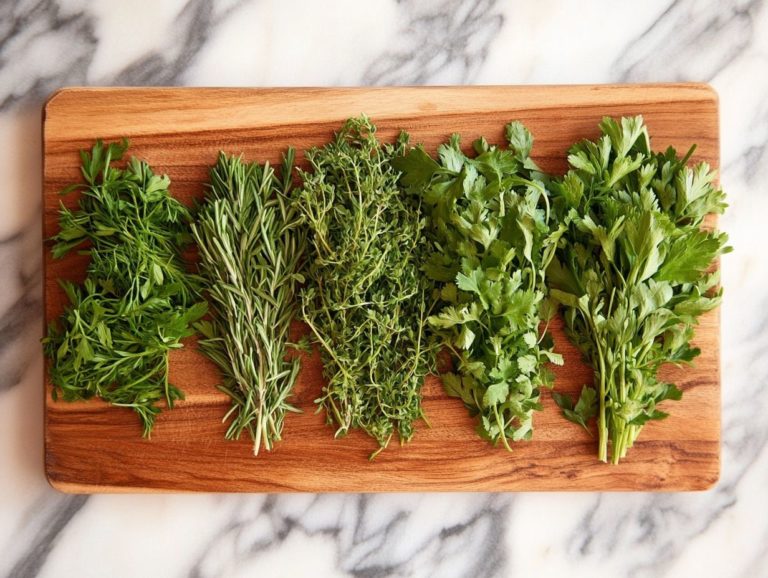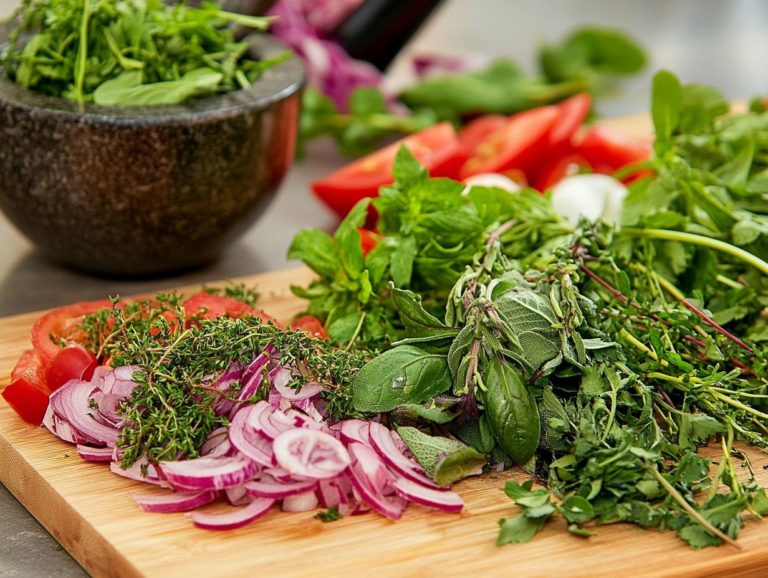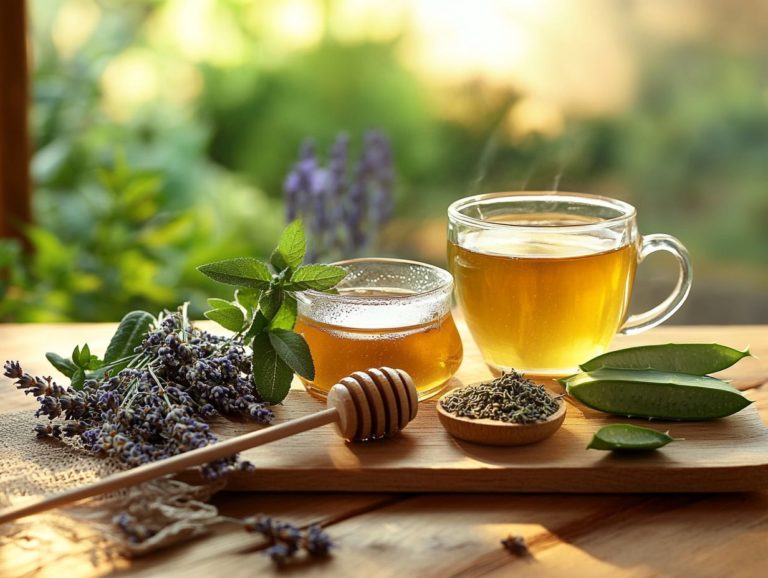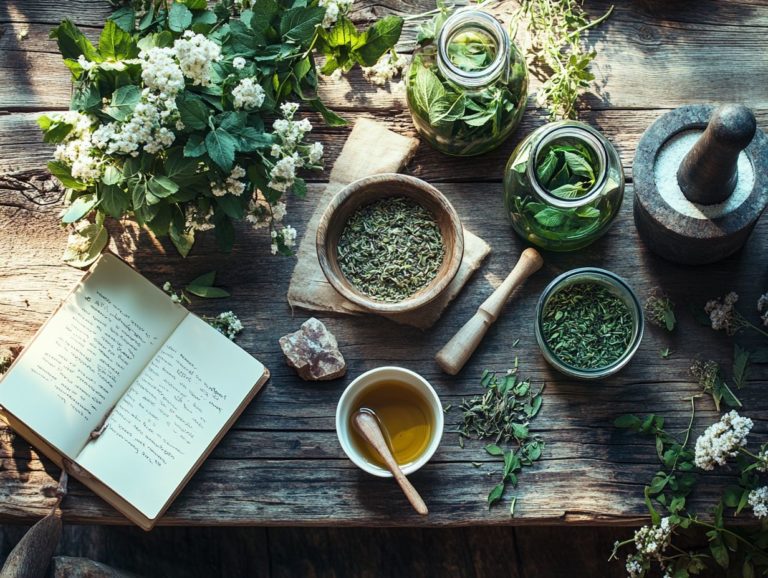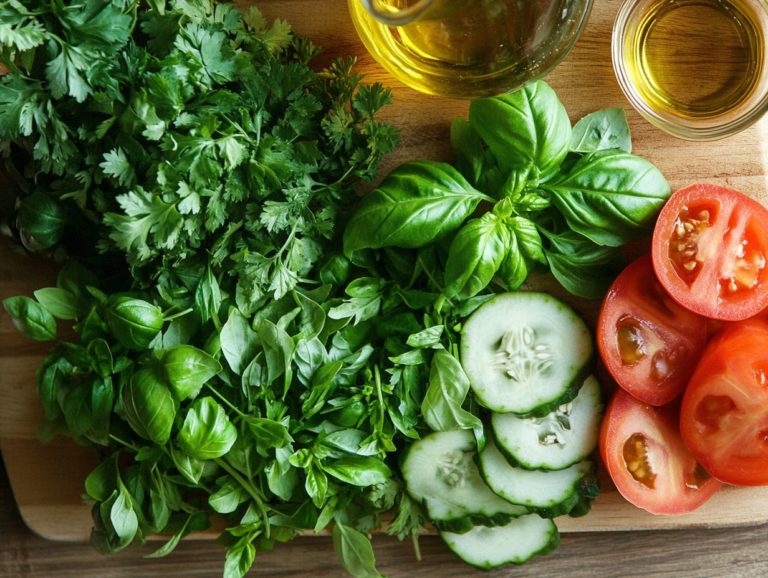5 Herbal Remedies to Try This Winter
As winter draws near, you’ll want to explore natural ways to maintain your health and fend off seasonal ailments. This exploration unveils five powerful herbal remedies that can elevate your immunity, soothe digestive discomfort, and alleviate congestion.
From the immune-boosting prowess of echinacea to the anti-inflammatory benefits of turmeric, these remedies provide a holistic approach to your winter wellness. You’ll learn what herbal medicine entails, how to use it safely, and discover other popular options worth considering.
Dive in and uncover how these natural remedies can enhance your health this winter!
Contents
Key Takeaways:
- Boost your immunity with Echinacea, a powerful herb that can help fight off winter illnesses.
- Elderberry is a natural antiviral agent that can help combat colds and flu during the winter months.
- Soothe digestive issues with ginger, a versatile herb that can also relieve inflammation and pain.
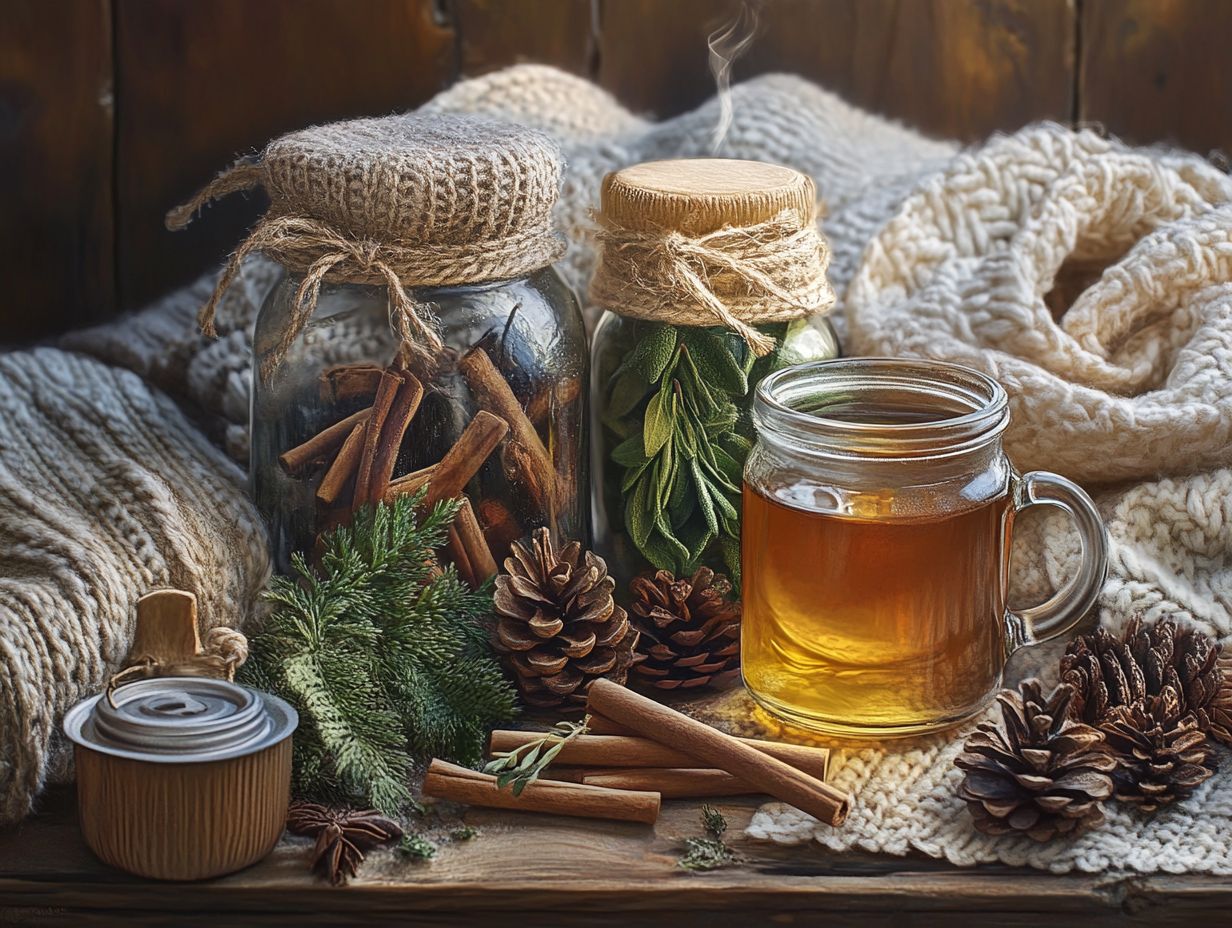
1. Echinacea for Boosting Immunity
Echinacea is a well-known herbal remedy that plays a vital role in enhancing your immunity, especially during the chilly months. It s a go-to for those who prefer natural methods to boost their immune health and ward off seasonal illnesses.
This vibrant flower, often seen in shades of purple and pink, is believed to stimulate your immune system by encouraging the production of white blood cells, helping you fend off colds and flu.
You can easily incorporate Echinacea into your daily routine in various forms be it capsules, tinctures, or teas each offering its own unique benefits. Echinacea tea, for instance, is not only soothing for your throat but also serves as a comforting ritual that can help prepare your body for the seasonal onslaught.
By consistently embracing this herbal solution, you can support your overall well-being, particularly during the cold and flu season.
2. Elderberry for Fighting Cold and Flu
Elderberry is renowned for its powerful antiviral properties, making it an exceptional remedy for combating cold and flu symptoms. You ll find that consuming elderberry syrup provides maximum health benefits.
This delightful syrup, brimming with antioxidants substances that fight free radicals in your body, supporting overall health serves as a natural alternative to over-the-counter medications. It offers relief from respiratory infections and alleviates the discomfort that often accompanies seasonal illnesses.
By integrating elderberry into your diet perhaps in smoothies, teas, or even baked goods you can enhance your immune function, particularly during those chilly months. Its high vitamin C content not only boosts immunity but also supports overall wellness, fortifying your body against viral invaders.
By making this remarkable berry a staple in your routine, you can better prepare yourself for the seasonal fluctuations and act now to protect your health this winter!
3. Ginger for Soothing Digestive Issues
Ginger is a remarkable herb, celebrated for its soothing properties that can effectively ease digestive issues. Its anti-inflammatory effects and ability to stimulate digestive enzymes make it a true ally for your gut health.
By alleviating nausea and reducing bloating, ginger serves as a natural remedy for anyone feeling discomfort after meals. Incorporating ginger into your winter recipes think warm soups, spicy teas, and hearty stews not only elevates the flavor but also offers a comforting way to nourish your body during the colder months.
Its beneficial compounds support a healthy gut, making ginger an excellent addition to your balanced diet, especially when you crave hearty, warming foods that are still wholesome.
Start integrating these remedies into your life today for a healthier winter!
4. Peppermint for Relieving Congestion
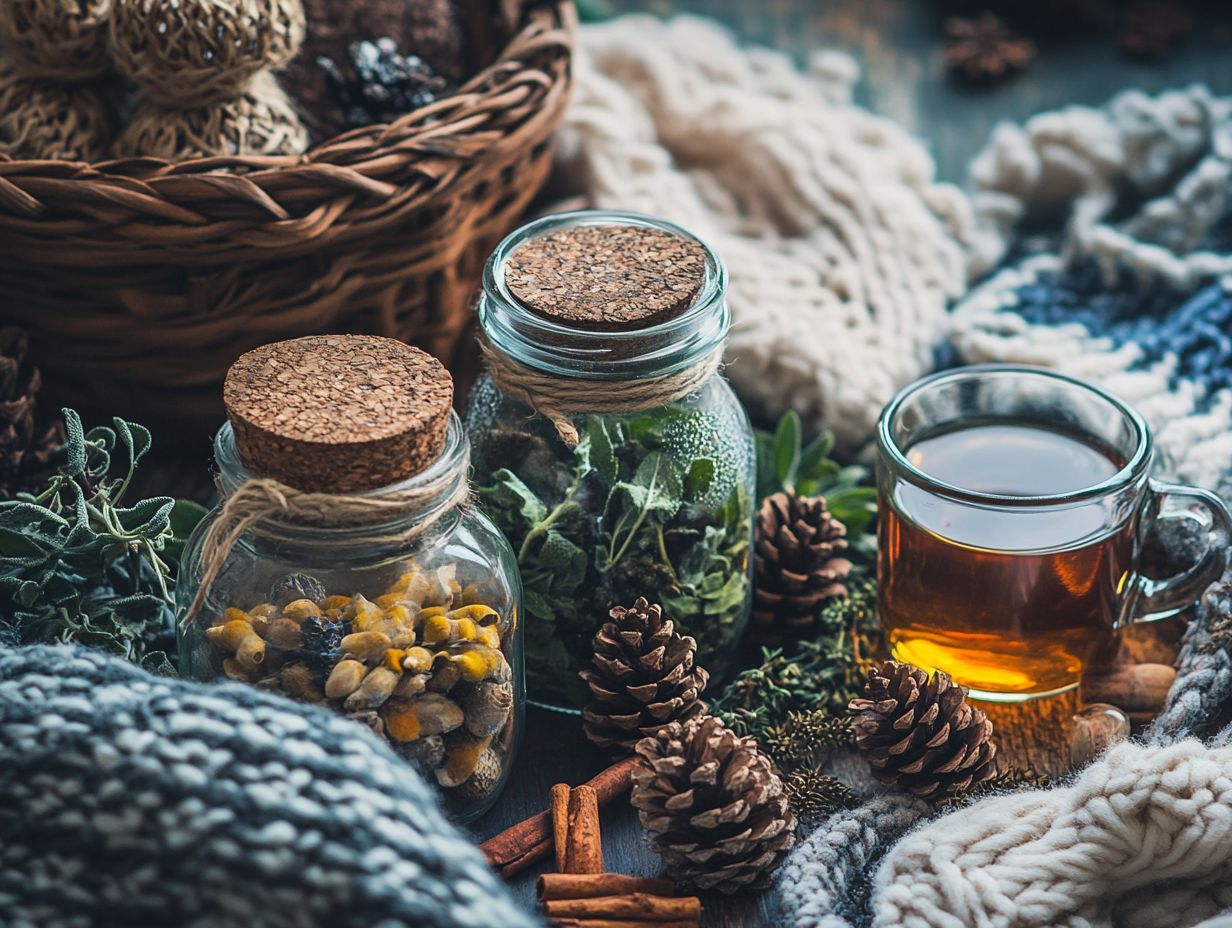
Peppermint is a remarkable herb known for relieving congestion. It is a favored option in herbal infusions and teas during the cold season.
This invigorating plant contains menthol, a natural compound that cools and soothes the respiratory tract. It promotes easier breathing and helps fend off infections.
To enjoy its benefits, brew some peppermint tea. Inhale the steam while sipping for immediate relief from nasal congestion.
You can also use peppermint essential oil in a diffuser or mixed with a carrier oil for a chest rub. This method enhances the calming aroma and promotes overall well-being.
5. Turmeric for Reducing Inflammation
Turmeric, containing the active compound curcumin, is known for its strong anti-inflammatory properties. It’s essential in herbal remedies for tackling inflammation during the cold season.
This versatile spice eases discomfort from arthritis and muscle strains while promoting overall wellness. Integrating turmeric into your diet taps into its potent benefits.
Try seasonal delights like golden milk, a comforting drink made by combining turmeric with warm milk and sweetness. It’s perfect for chilly evenings.
Incorporate turmeric into hearty soups to enhance flavors and boost your health. It’s a smart choice for strengthening your immune system against winter ailments.
What Is Herbal Medicine and How Does It Work?
Herbal medicine utilizes the strength of plants for healing and wellness. It uses herbs known for their healing properties, especially to enhance immune resilience during the cold season.
This ancient practice has roots in various cultures and has been passed down for thousands of years. Today, it serves as a complementary approach to conventional treatments.
You ll find many herbal remedies, including tinctures, teas, and capsules. Herbs like Echinacea and elderberry are popular for their reputed abilities to strengthen the immune system.
Echinacea helps shorten cold duration, while elderberry syrup may ease flu symptoms and support respiratory health. These natural options can significantly enhance your overall bodily function.
What Are the Different Types of Herbal Remedies?
Herbal remedies come in various forms, such as infusions, tinctures, and capsules, all designed to harness the healing powers of medicinal herbs.
For instance, ginger alleviates digestive troubles and may reduce inflammation. It’s popular for those seeking natural relief from nausea or sore muscles.
Peppermint refreshes your breath, supports digestion, and can ease headaches when used as essential oil. Enjoy a cup of ginger tea in the morning or apply peppermint oil for a calming massage.
Before trying a new remedy, consult with a healthcare professional. This ensures that your choices complement your health regimen safely and effectively.
How Can Herbal Remedies Be Used Safely and Effectively?
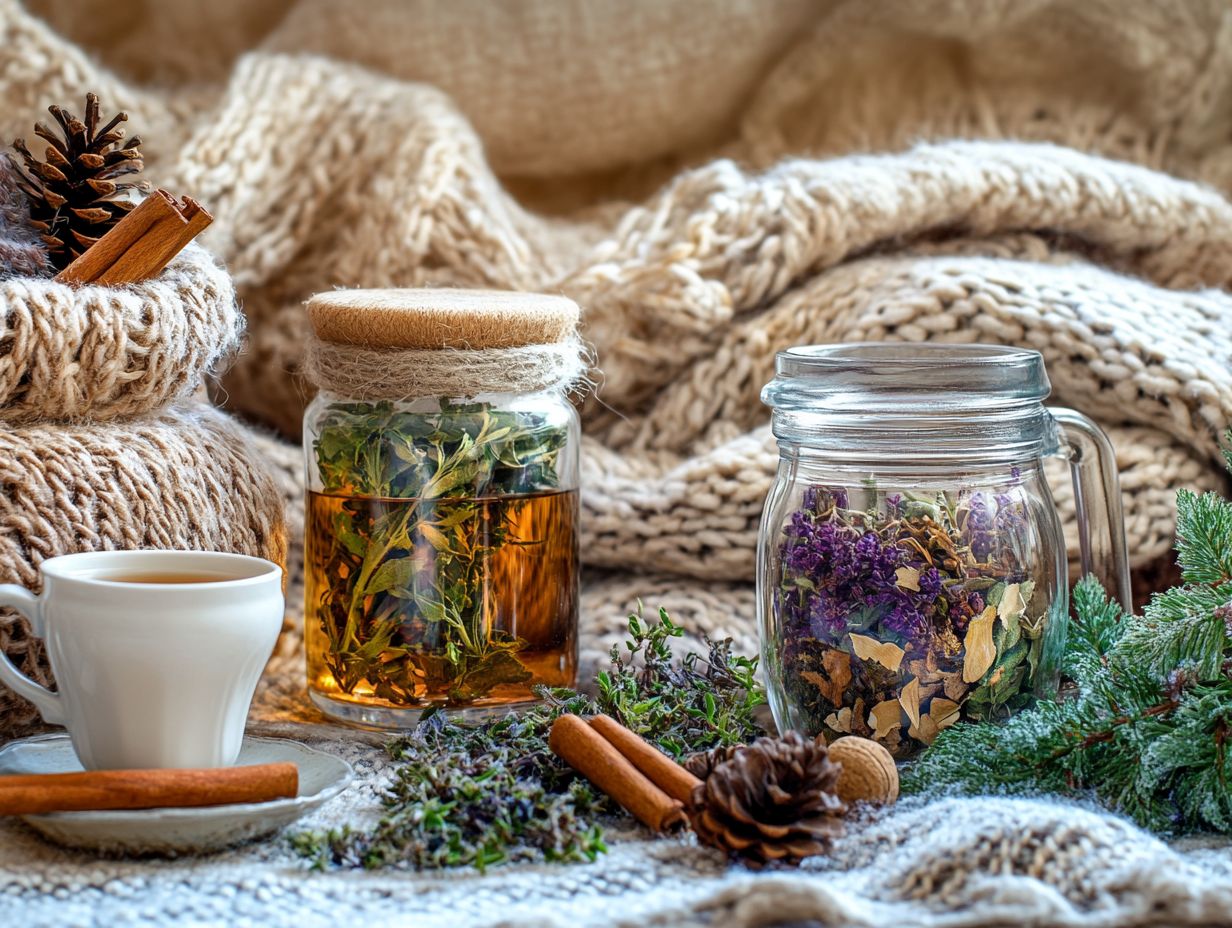
Using herbal remedies safely and effectively requires a keen understanding of proper dosage, potential interactions with medications, and your unique health conditions to truly maximize their benefits.
It’s essential for you to consult with a healthcare provider before you start integrating these natural alternatives into your wellness routine. This ensures that the remedies you choose align with your specific health profile and medical history.
The significance of quality sourcing cannot be overstated; choosing trusted brands or selecting locally harvested herbs can profoundly impact the effectiveness and safety of the remedies you use.
Foraging means gathering wild plants for food and remedies. While foraging can be a rewarding experience, it s important to be mindful of ethical practices. Ensuring sustainable harvesting methods respects the environment while promoting a holistic approach to a healthy lifestyle.
What Are the Possible Side Effects of Herbal Remedies?
While you may view herbal remedies as appealing natural alternatives, it s essential to recognize that they can also bring potential side effects. Understanding each herb’s properties and any contraindications is crucial.
Take garlic, for example. It’s celebrated for its numerous health benefits, but it can also lead to gastrointestinal issues, skin reactions, or even unwanted interactions with certain medications.
Then there’s echinacea, a popular choice for boosting the immune system, which might cause allergic responses or digestive disturbances in some people. Given these possible adverse effects, it’s vital for you to conduct thorough research and consult healthcare professionals before adding herbal supplements to your routine.
This mindful approach not only helps you mitigate risks but also enhances the overall safety and effectiveness of your herbal usage.
How Can One Incorporate Herbal Remedies into Their Daily Life?
Incorporating herbal remedies into your daily routine can significantly improve your well-being and foster healthy habits. Whether cooking with fresh herbs, enjoying herbal teas, or visiting wellness spas that specialize in herbal treatments, the benefits are abundant.
Consider starting each day with a warm cup of herbal infusion, like ginger or chamomile; these soothing beverages can calm your stomach and clear your mind.
Elevate the flavors of your meals by adding fresh herbs like basil or cilantro, which not only taste great but also provide a wealth of essential nutrients.
If you’re inclined towards DIY projects, making simple tinctures or herbal infusions at home can be both enjoyable and rewarding.
When seeking your herbs, explore local health food stores; they often have quality and organic options. Don t hesitate to engage with the staff; they can offer valuable recommendations on popular herbs and blends that align with your health goals.
What Are Some Other Popular Herbal Remedies for Winter Ailments?
Along with echinacea and elderberry, you’ll find a wealth of herbal teas for holistic wellness that can enhance your health during the winter, keeping those pesky seasonal ailments at bay.
- Reishi Mushroom: Celebrated for its stress-reducing qualities and ability to enhance vitality.
- Astragalus Root: Works diligently to strengthen your body’s defenses against illnesses.
- Garlic: The culinary superstar, brimming with allicin, which boasts impressive antiviral and antibacterial properties.
Incorporating these herbs into your routine is a breeze. Whether you brew them into soothing teas or toss them into hearty soups and stews, they effortlessly blend into a nourishing diet that keeps you warm and well-fed throughout the colder months.
Frequently Asked Questions
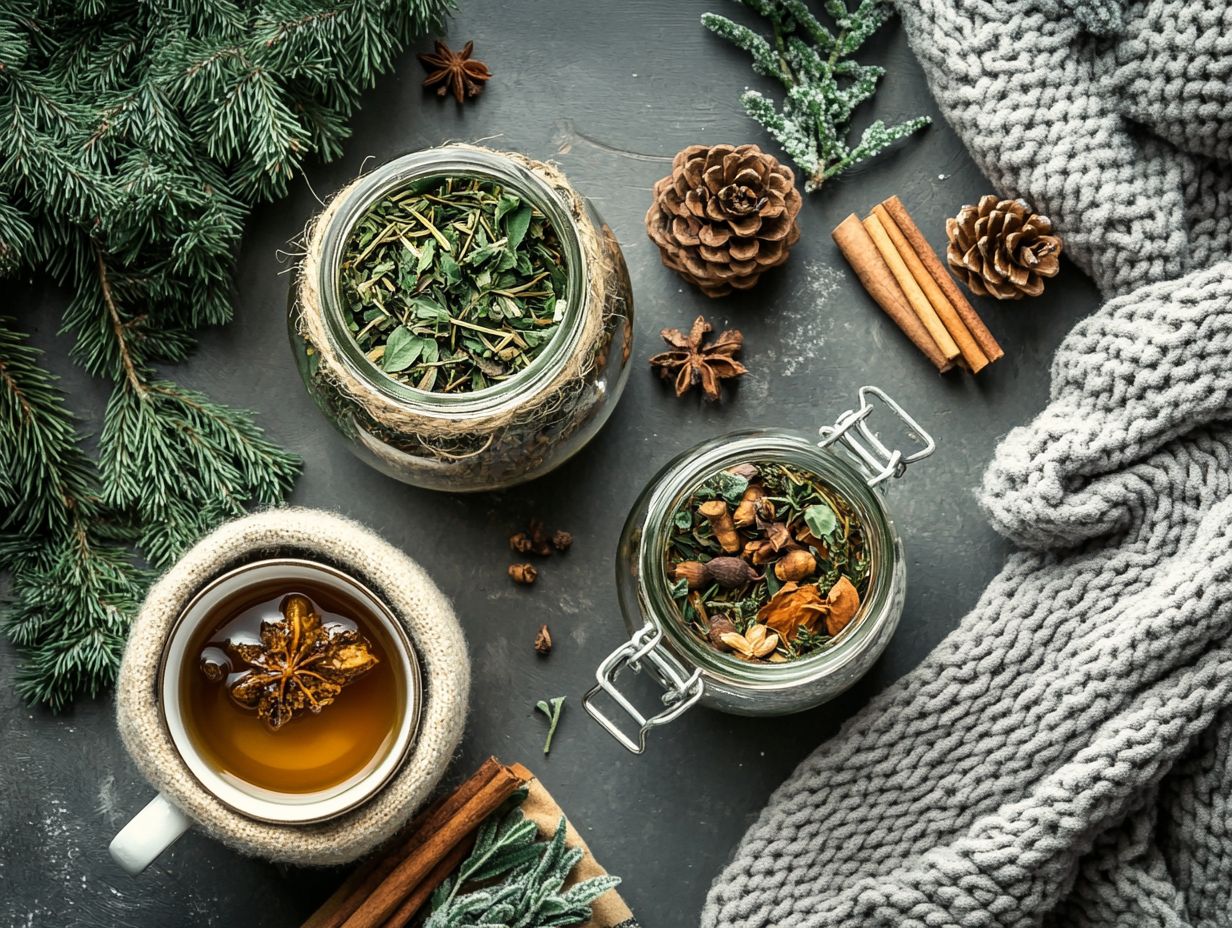
Ready to boost your health this winter? Explore these herbal remedies today!
1. What are the benefits of herbal remedies this winter?
Herbal remedies offer a natural way to tackle winter issues like colds and dry skin. For instance, exploring the top 5 herbs for cold prevention can provide gentler alternatives to over-the-counter meds while strengthening your immune system!
2. Can I use herbal remedies with my medications?
Always check with your healthcare provider before trying herbal remedies if you’re on medication. Some herbs can interact negatively with drugs.
3. How do I choose the right herbal remedies?
Research and consult a healthcare professional for tailored advice on herbal remedies. Look for those traditionally used for winter ailments, like ginger for colds!
4. Are there side effects from herbal remedies?
Herbal remedies can have side effects, just like any other supplement. Follow the dosage instructions, and stop if you notice any adverse reactions.
5. How should I take herbal remedies?
Herbal remedies come as teas, capsules, and powders. Always follow the package instructions or ask your healthcare provider for guidance!
6. Are herbal remedies safe for kids?
Not all herbal remedies are kid-friendly. Consult a pediatrician and adjust dosages based on age and weight for safety.

